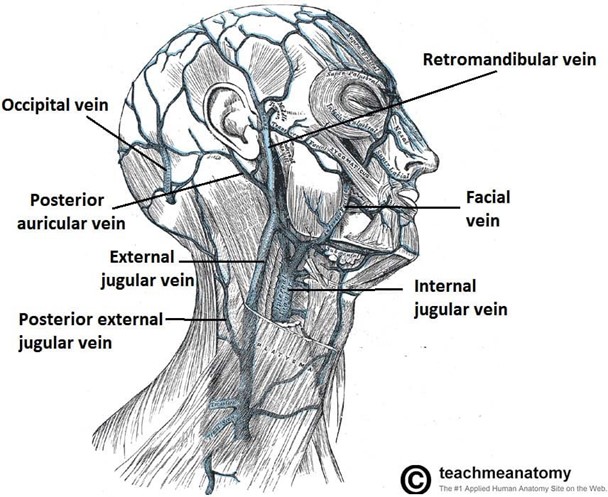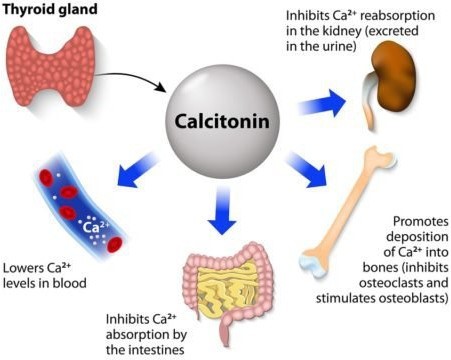Blood from the face and scalp is drained by the:
Superior vena cava.
Subclavian vein.
External jugular vein.
Cephalic vein.
The Correct Answer is C

This is because the external jugular vein drains blood from the face and scalp into the subclavian vein.
Some possible explanations for the other choices are:
Choice A. Superior vena cava.
This is wrong because the superior vena cava is a large vein that collects blood from the head, neck, chest, and upper limbs and returns it to the right atrium of the heart.
It does not drain blood from the face and scalp directly.
Choice B. Subclavian vein.
This is wrong because the subclavian vein is a vein that receives blood from the external jugular vein, the internal jugular vein, and the vertebral vein and joins with the internal thoracic vein to form the brachiocephalic vein.
It does not drain blood from the face and scalp directly.
Choice D. Cephalic vein.
This is wrong because the cephalic vein is a vein that runs along the lateral side of the arm from the hand to the shoulder and empties into the axillary vein.
It does not drain blood from the face and scalp at all.
Normal ranges for blood pressure vary depending on age, gender, health status, and other factors, but a general guideline is that systolic blood pressure (the pressure when the heart contracts) should be less than 120 mmHg and diastolic blood pressure (the pressure when the heart relaxes) should be less than 80 mmHg.
Nursing Test Bank
Naxlex Comprehensive Predictor Exams
Related Questions
Correct Answer is A
Explanation

Calcitonin is a hormone that protects against excessive blood calcium levels by inhibiting bone turnover and decreasing reabsorption.
It is produced by the thyroid gland and acts on both osteoclasts and osteoblasts.
Choice B is wrong because parathyroid hormone (PTH) stimulates both resorption and formation of bone, and controls the level of calcium in the blood.
Choice C is wrong because thyroxine is a thyroid hormone that is required for skeletal maturation and influences adult bone maintenance but does not directly affect calcium deposition into bone.
Choice D is wrong because insulin is a hormone that regulates both bone formation and bone resorption but does not specifically stimulate calcium deposition into bone.
Correct Answer is A
Explanation
This is because ventricular systole is the phase of the cardiac cycle when the ventricles contract and pump blood into the arteries.
The blood pressure in the arteries is greatest during this phase because of the forceful ejection of blood.
Choice B.
Atrial diastole is wrong because atrial diastole is the phase of the cardiac cycle when the atria relax and fill with blood from the veins.
The blood pressure in the arteries is lowest during this phase because the ventricles are also relaxed and not pumping blood.
Choice C.
Ventricular diastole is wrong because ventricular diastole is the phase of the cardiac cycle when the ventricles relax and fill with blood from the atria.
The blood pressure in the arteries is low during this phase because the ventricles are not pumping blood.
Choice D.
Atrial systole is wrong because atrial systole is the phase of the cardiac cycle when the atria contract and push blood into the ventricles.
The blood pressure in the arteries is not affected by this phase because the ventricles are still relaxed and not pumping blood.
The normal range for systolic blood pressure is less than 120 mm Hg and for diastolic blood pressure is less than 80 mm Hg.
Whether you are a student looking to ace your exams or a practicing nurse seeking to enhance your expertise , our nursing education contents will empower you with the confidence and competence to make a difference in the lives of patients and become a respected leader in the healthcare field.
Visit Naxlex, invest in your future and unlock endless possibilities with our unparalleled nursing education contents today
Report Wrong Answer on the Current Question
Do you disagree with the answer? If yes, what is your expected answer? Explain.
Kindly be descriptive with the issue you are facing.
